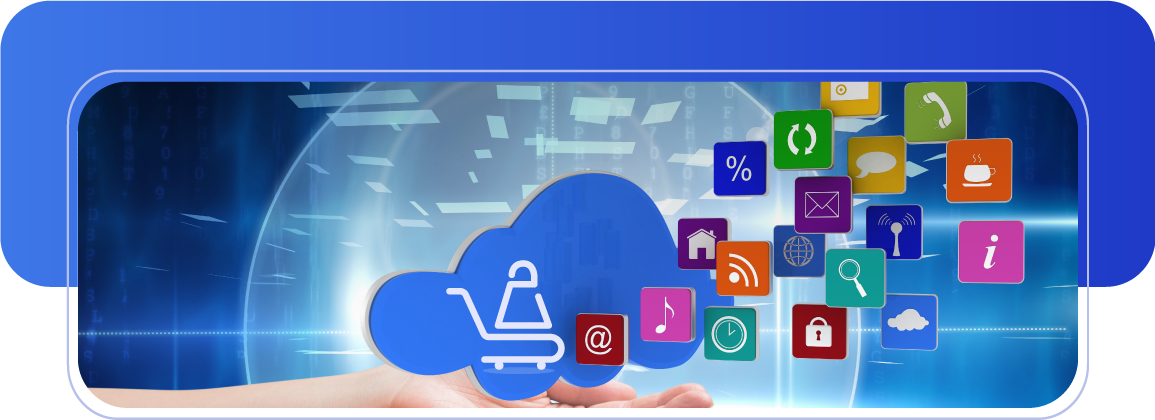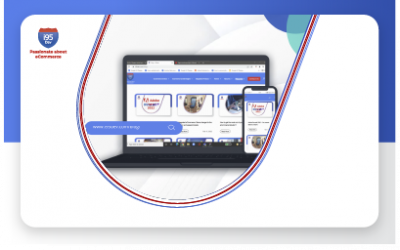Understanding Integrated eCommerce
and Exploring its Benefits

It is not feasible for online businesses to rely on multiple platforms and applications to run their daily operations. They require an integrated system that connects the ERP, POS, eCommerce, sales channels, and other systems with each other to create a centralised database. It is at this point, integrated eCommerce turns out to be a boon.
What is integrated eCommerce?
An integrated eCommerce solution makes use of the existing business logic and data from your ERP (and additional systems) to power your online store. In other words, it directly connects the ERP system to your eCommerce store without the intervention of a third-party connector. The integrated eCommerce solution is partially installed inside the ERP system. It functions in a simple and seamless manner unlike other complex integrated solutions.
What are the benefits of integrated eCommerce?
An integrated eCommerce platform helps in revamping managerial and organizational productivity. It not only delivers better output but also helps in saving time and manual workload by allowing the business to use an arrangement of integrated functions to handle the business and also enables them to do back-office work automatically. Its speedy and consistent applications help in accommodating data that is error-free and in no time.
1) Timely updates and inventory management
We all know that the online retail space is dynamic and extremely competitive. Millions of products are sold every day and millions of transactions happen from innumerable accounts. In such a case, if the prices do not match the competitor’s pricing and the products are not aligned with the consumer trends, imagine the disaster we are inviting!
To put things right, timely updates and inventory control is a must. It keeps customers positive towards your company. An integrated eCommerce solution helps in providing real details in real time, preventing a product or pricing calamity. For instance, when an order is placed by a customer on the front-end, the integrated system updates the back office accounts and inventory automatically. It helps you monitor and forecast accurate production capacity and material shortages. Therefore, these two-way integrated applications help you keep the data synced and updated saving your from underselling or overselling.
2) Timely delivery
Meeting customer’s expectations and delivery requirements should be priority for every enterprise. Many of the businesses face problems of delayed delivery due to which they lose credibility and customers. A habit of letting go of poor on-time delivery service can damage customer relationships to an extent that it may turn irreparable.
With the help of integrated eCommerce software, the order flow is smooth, seamless, and flawless. Automatic information created by an integrated eCommerce platform provides instant information and an organised productive flow of information and accurate data. An integrated quoting system reliable and accurate, and instantly suggests possible delivery dates by analysing the production floor and warehouse. In addition, an integrated eCommerce platform ensures that no orders are missed and deliveries are rolled out on time.
3) Improve customer experience
In today’s world of digitalisation, when there is cut-throat competition everywhere, how do you stay ahead of your competitors? It’s simple. Keep your customers satisfied! A satisfied customer is as an asset for any business.
With the help of integrated eCommerce, you can now keep your customers satisfied and updated with the real-time availability of price, inventory, and order tracking.
In addition, integrated eCommerce enables you to carry out integrated marketing in the form of email marketing, online advertisements, direct marketing, social media marketing, automated marketing, and more. It helps you directly cater to the requirements of your customers, retain your loyal clientele, and make new customers.
4) Managing finance and accounts
Many of the businesses make use of a financial management system and an ecommerce platform separately, thereby creating silos of information and making it cumbersome to keep track of the overall finance.
What if you were able to acquire all the financial information you need from a single online database? Managing finance would be like taking a walk in the park.
An integrated eCommerce solution helps you save time and reduce errors by automating payment transfers and sales data from the front-end store to the back-end financial system. It enables your finance team to access data they need, from any part of the globe, at any given time. They can access sales revenue information, carry out accurate financial reporting, manage accounts and payrolls, prepare budgets and purchase charts, and keep an eye on all the financial transactions in real-time.
5) Enhance team efficiency and decision-making through data integration
Pick any retailer and you will find him maintaining three kinds of database – financial data, product data, and consumer data. Although these databases have completely separate information, it is imperative to study them together before making important business decisions.
If these three data are stored separately on different systems, it is problematic to leverage the goldmine of real-time data available to the enterprise. Therefore, an integrated eCommerce platform helps in making full use of data resources and enables teams to deliver better productivity and improve efficiency.
For example, an integrated and automated sales process reduces the amount of time wasted on time-consuming tasks and enables your sales team to spend more time where it matters most – Interactive selling! When your team dedicates time in nurturing personal relationships with prospects, you tend to convert them into loyal customers.
With such terrific advantages of integrated eCommerce, you can gain better control over your business and build an improved rapport with your customers.
Looking for an integrated eCommerce solution?
i95Dev’s eCommerce Growth Engine is a feature rich multi-channel integrated eCommerce solution, powered by Magento, for Microsoft Dynamics and SAP ERP systems. The solution helps retailers, manufacturers, and distributors drive sales and establish themselves as a global brand; paying not just for itself but for their ERP systems as well.
https://www.i95dev.com/integrated-ecommerce/ecommerce-for-microsoft-dynamics/
Recent Blogs
Enhancing Shipping Precision with Custom Shipping Groups in Adobe Commerce/ Magento
Enhancing Shipping Precision with Custom Shipping Groups in Adobe Commerce/ Magento Author Category Share Three things matter the most when it comes to eCommerce shipping: speed, accuracy,...
Managing Massive Product Catalogs: Why Synchronization is the Key to Efficiency
Managing Massive Product Catalogs: Why Synchronization is the Key to Efficiency Author Category Share The automotive aftermarket industry is vast and highly competitive, requiring businesses...
A Complete Guide to Seamlessly Integrating Adobe Commerce with NetSuite
A Complete Guide to Seamlessly Integrating Adobe Commerce with NetSuite Author Category Share Integrating Adobe Commerce (formerly Magento) with NetSuite ERP can transform the way businesses...



